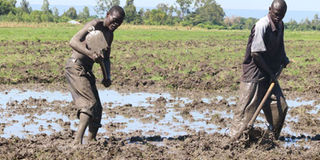Planned authority to weed graft out irrigation schemes

The proposed law says that counties will be in charge of small-scale irrigation schemes, a function that is currently handled by the national government. FILE PHOTO | NMG
What you need to know:
- Irrigation schemes will undergo periodic audits to rid them of financial and governance inconsistencies, if a new legislation on establishment of the National Irrigation Development Authority (NIDA) is adopted.
- The Irrigation Bill 2017 currently at committee stage in Parliament seeks to promote and regulate development and management of irrigation in Kenya.
- The Bill sponsored by Majority Leader in the National Assembly Aden Duale provides for regulation of irrigation, which Kenya is banking on to cut overreliance on rain-fed agriculture.
- NIDA will replace the current National Irrigation Board (NIB).
Irrigation schemes will undergo periodic audits to rid them of financial and governance inconsistencies, if a new legislation on establishment of the National Irrigation Development Authority (NIDA) is adopted. The Irrigation Bill 2017 currently at committee stage in Parliament seeks to promote and regulate development and management of irrigation in Kenya. The Bill sponsored by Majority Leader in the National Assembly Aden Duale provides for regulation of irrigation, which Kenya is banking on to cut overreliance on rain-fed agriculture.
NIDA will replace the current National Irrigation Board (NIB). Its mandate will be expanded to include water harvesting, flood control and water storage infrastructure. “The authority shall conduct periodic technical and management audits of irrigation schemes to identify problems with scheme infrastructure, governance, management and financing, as well as recommend solutions to the irrigation water users’ associations,” reads a clause in the Bill.
The new agency’s director, an appointee of the Ministry of Agriculture secretary, will have overriding powers over board members who include a chairman appointed by the President.
The Bill also introduces new qualifications that require all serving employees of NIB to re-apply for their positions.
The proposed law also says that counties will be in charge of small-scale irrigation schemes, a function that is currently handled by the national government.
Kenya is cutting overreliance on rain fed agriculture, which has been blamed for perennial hunger, into irrigation. Apart from roads and railway networks, irrigation is one of the sectors in which the government has been investing a lot of money — averaging Sh9 billion every year over the last decade. The government embarked on revamping the existing irrigation schemes as well as establishing new ones, the end game being to ensure the country is food secure.
However, implementation of this agenda has been marred with irregular award of tenders for the irrigation projects, meaning that farmers have had to go back to the drawing board to seek other survival mechanisms.
A 2016 site visit in Turkana by the Public Procurement Regulatory Authority (PPRA) established that the NIB awarded 15 irregular tenders for the irrigation schemes worth Sh953 million.
The tour was conducted following a petition to Parliament by residents calling for audit of all the irrigation projects, which they said had since stalled and were not giving value for money.
The PPRA found out that the NIB was in breach of procurement laws through revising contract costs, issuing restricted tenders beyond the Sh20 million limit as well as the tender committee proceeding despite lack of quorum.




